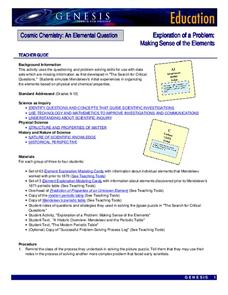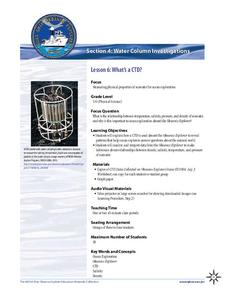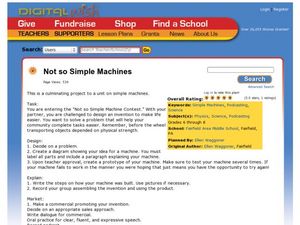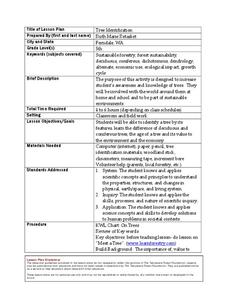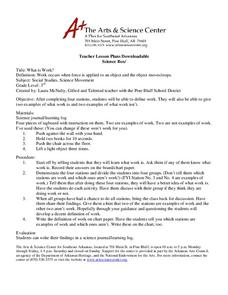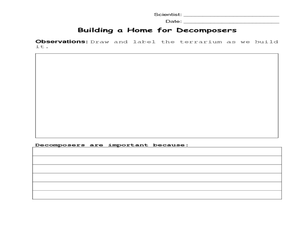It's About Time
Why Air Bags?
If a heavy steel car can't protect you from injury, how can a bag filled with air? The lesson answers this question and many others as young scientists experiment with the impulse and forces related to air bags in automobiles.
It's About Time
Automatic Triggering Devices
How does the air bag trigger in an accident? The lesson explores how automatic triggering devices work in automobiles. Using examples such as a seat belt lock and air bag, scholars design their own device to better understand the...
NASA
Exploration of a Problem: Making Sense of the Elements
When given too much data to simply memorize, it helps to sort it into manageable groups. The second lesson in the six-part series of Cosmic Chemistry challenges groups of pupils to take a large amount of data and figure out how to best...
NOAA
What's a CTD?
Why are the properties of the water important when exploring the ocean? Young scientists discover the tools and technology used in deep sea exploration in the fourth installment in a five-part series. Groups work together to examine...
DiscoverE
My Friend Robot
Can you do better than a robot? Teams write instructions for a hypothetical robot to build a structure. They test their instructions by acting them out to see if they produce the desired structure.
Curated OER
Do You Live a Healthy Lifestyle?
Fifth graders examine and evaluate how active their own lifestyle is by counting how many steps they take on a daily basis. They watch a PowerPoint presentation about healthy lifestyles, record how many steps they take in a day with the...
Curated OER
Not So Simple Machines
Students design a simple machine for a simple machine contest. In this simple machine lesson, students design a simple machine that will solve a problem. They draw a diagram, label it, and test the machine before they present it in a...
Curated OER
Beaver Ecology
Students explore the lives of bgeahvers. They identify the physical and behavioral adaptations that help beavers survive in their environment. Students compare and contrast how beavers influence the ecology of both forest and aquatic...
Curated OER
Forest Floor Terrarium
Students study the aspects of a forest floor ecosystem, including decomposition, the water cycle, food webs, the needs of living things, and physical vs. chemical change over an extended period. In addition, students conduct observations...
Curated OER
Archimedes' Principle
Young scholars examine the relationship between density and buoyancy. In this physics lesson students use Archimedes' Principle to complete calculations on buoyancy and a lab activity.
Curated OER
We Tumble Together
Third graders follow a rubric to create a gymnastic tumbling routine set to music. They videotape and review their performances.
Curated OER
What Makes A Bird A Bird?
Students identify the characteristics of birds and explain how these characteristics are useful in their survival. They explain how both physical and environmental adaptations help birds survive and reproduce. Students create an...
Curated OER
Tree Identification
Students list four ways to identify trees. In this tree identification instructional activity, students use tree identification techniques such as leafs, bark, wood grain, soil type, and climate to create tables and graphs.
Curated OER
Written Document Analysis Worksheet
In this writing and reference worksheet, young scholars identify and name the physical qualities of a document of their choice. Then they identify three major things the author stated that are important and why they believe the document...
Curated OER
Water and Ice
Students explore the states of matter. In this physical science lesson, students observe what happens to water when it freezes and record observations. Students then observe ice when it melts and record observations.
Curated OER
The Gettysburg Address
Students examine Lincoln's life. In this U.S. history lesson, students examine facts about Abraham Lincoln and then complete 6 extension activities that require them to complete research regarding the Civil War.
Curated OER
The Challenge of School Violence
Students examine school violence. In this school violence lesson plan, students listen to a teacher-led lecture regarding statistics and studies about school violence. Students discuss ways to deter school violence and participate in a...
Curated OER
What is Work?
Third graders investigate the concept of force and work. In this physics instructional activity, 3rd graders visit four stations which include pushing the wall with your hand, holding books for ten seconds, pushing a chair, and lifting a...
Curated OER
Weight Training
Students begin writing their individual weight training programs after a discussion of body types, and principles of training, and an anatomy game for a review of muscles. Students have a reflection writing on goals for assignment.
Curated OER
Rocks Up!
Students will design and build a structure to support a rock. Students will use their knowledge of movement of objects to determine the proper base to be built to support their rock. Students will explore their natural area for...
Curated OER
Introductory Learn to Swim
Students perform introductory swimming techniques. They review water safety rules. Students blow bubbles and put their head into the water. They touch designated body parts while standing in the water and finally touch the bottom of...
Curated OER
De-composers - Terrarium
Students explore the environment by building a mock ecosystem. In this rainforest analysis lesson, students define many environmental and rainforest related vocabulary terms and discuss the current status of our planet's rainforests....
Curated OER
Calendar Communication
Students identify days, dates, and month on a calendar. For this calendar lesson, students use a blank calendar page and fill in the days of the month. Students recall what they learned on specific days and record that information as well.
Curated OER
Spark Super Stepper
Students measure their steps with pedometers. In this pedometer instructional activity, students attempt to take as many steps as possible during an assigned time or during recess. They walk around track monitoring their progress.




